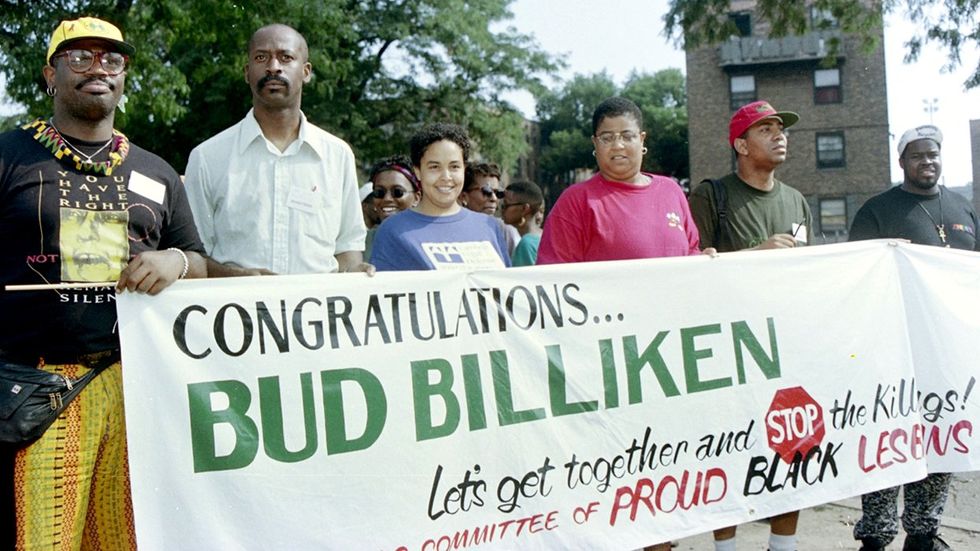The first time that an LGBTQ+ contingent marched in Chicago’s Bud Billiken Parade, an iconic annual event in the city’s Black community, will be celebrated with a film screening, panel discussion, and reception this Sunday.
The documentary Why We Marched: Black LGBTQs & the 1993 Bud Billiken Parade, marking the 30th anniversary of the LGBTQ+ group’s entry into the parade, will be shown at the free event, which runs from 4 to 8 p.m. at Affinity Community Services.
The parade, organized by the charitable arm of The Chicago Defender, a newspaper serving the city’s Black population, has been held every summer since 1929 on Chicago’s heavily Black south side. It is named for a mascot created by the paper for its children’s clubs; the mascot represents a protector of children. Since its inception, the Bud Billiken Parade "has united African-Americans throughout the city of Chicago in music, dance, food, and laughter," the paper's website says. "It’s one of the only spaces where we can openly and emphatically praise the historic roots that plant us into the South Side of Chicago."
In 1993, the Ad Hoc Committee of Proud Black Lesbians and Gays applied to march in the parade and was turned down; the official reason given was that the parade didn’t have room for the contingent. But the committee filed an identical application that didn’t use the words “gays” or “lesbians,” and it was accepted. The group then filed a complaint against Chicago Defender Charities with the city’s Commission on Human Relations, alleging discrimination based on sexual orientation, and after a very public fight, the Ad Hoc Committee won a place in the parade. It was a significant victory for representation and inclusion; there were few LGBTQ+ groups in Chicago’s Black neighborhoods, and those in other areas were dominated by whites.
Chicago filmmaker Magdiel Carmona interviewed several of the 1993 parade participants for his documentary. “Working on this and learning about the parade has given me a lot of strength the last couple of months,” he said in a press release. “It’s fortifying because it reminds me that very incredible people cared enough about our community today that they were willing to face some very difficult challenges back then. It’s important to preserve these stories in as many ways as we can, because that creates history and that history creates language and that language becomes our culture.”
Affinity, the Black LGBTQ+ social justice group hosting the event, “is a direct result of that amazing group of folx that marched in 1993,” Executive Director Latonya Maley said in a press release. “We are proud to host our community for a long-overdue celebration.”
The event will begin with a reception and refreshments at 4 p.m., and the film will screen at 5 p.m. A panel discussion, a Q&A, and a call to action will follow. Jano Layne, who originally proposed the idea of an LGBTQ+ contingent, will be one of the 1993 contingent members participating in the panel discussion. Layne will be joined by fellow marchers Karen Hutt, Robert Schultz III, and Lisa Marie Pickens. “It’s time that we celebrate this often-overlooked historic moment in Chicago history when a group of Black openly LGBTQIA+ folks fought to take our rightful place in our community’s largest parade,” Layne said. Jayy Jayy, Lil Tree, and Ermalshara, representing the younger generation of Black LGBTQ+ advocates, will discuss how the Ad Hoc Committee’s action affected their lives and also talk about the current state of Black LGBTQ+ activism.
Sponsors of the event are the 30th Anniversary Ad Hoc Committee of Proud Black Lesbians and Gays, Affinity, Arise Consulting, Carmona Producxions, PrideIndex.com, and Radical Healing Lab.
Although the event is free, reservations are recommended; RSVP at Eventbrite.com. It will be livestreamed on Affinity’s Facebook page for those who can’t attend in person. Affinity is located at 2850 S. Wabash Ave., #108 (rear entrance), in Chicago. Free on-site parking is available.













































































